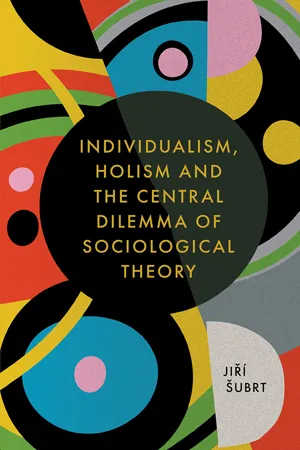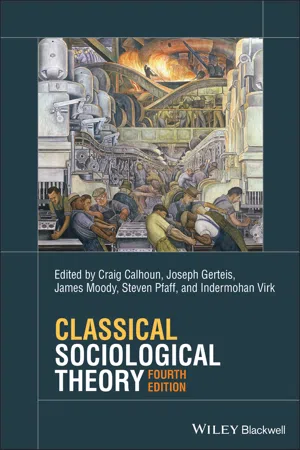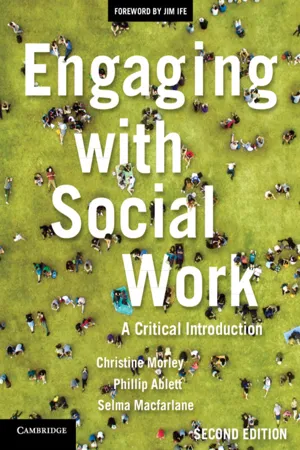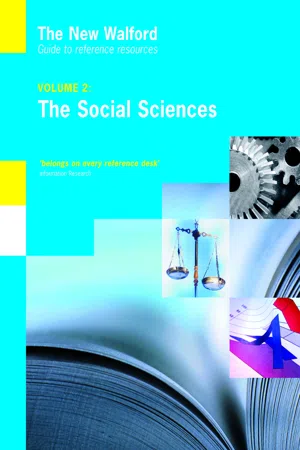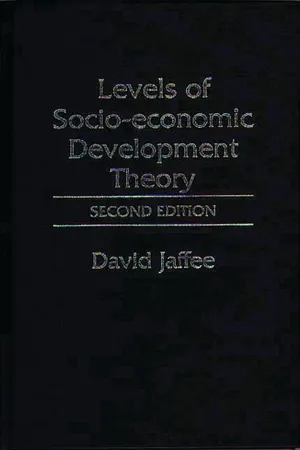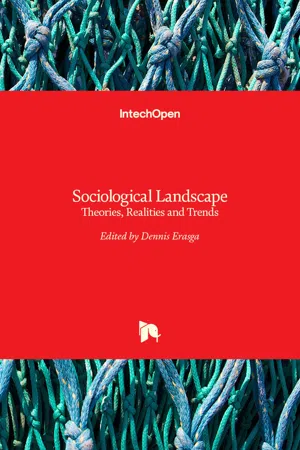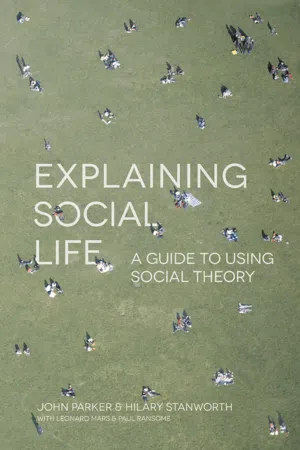Social Sciences
Sociological Theories
Sociological theories are frameworks for understanding and analyzing society and social behavior. They provide explanations for how and why individuals and groups interact, and how social structures and institutions shape human behavior. These theories help sociologists make sense of social phenomena and guide research and analysis in the field of sociology.
Written by Perlego with AI-assistance
Related key terms
1 of 5
11 Key excerpts on "Sociological Theories"
- Jiří Šubrt(Author)
- 2019(Publication Date)
- Emerald Publishing Limited(Publisher)
Chapter 1
What is Sociological Theory?
In this book, individualism and holism represent two distinct perspectives typically applied in the process of the formation of theory in the social sciences, specifically in the field of sociology; therefore, it is sensible to make a brief excursion to view the complex way theory is structured in contemporary sociology.The word theory is nowadays used in both scientific and everyday discourse, and in any given context, people usually have some idea what it means. Theory, especially but not only in lay terms, tends to be set in opposition to practice. As such it is associated with attempts at a rational interpretation of phenomena in a particular field (nature, society, human beings) based on very general, abstract forms of thought – such as concepts, opinions, hypotheses and laws. With the help of these, internally logical systems of understanding are developed that we can call theories in the broader sense of the word. Theory is not a direct, immediate description of really occurring phenomena, but rather an attempt to identify and interpret their basic features in an idealised and abstract way. Since every scientific study is by nature selective (never able to take into account every single aspect connected with a segment of reality), no theory can capture a studied phenomenon in its full complexity, but must in some way be reductive. Moreover, individual specific phenomena have characteristics of varying importance to different scientific fields of enquiry.Here a preliminary guideline is provided by Austrian sociologist Max Haller’s assertion that social-scientific and sociological theory is ‘a system of general statements with a systematic link to empirically observable social phenomena’ (Haller, 1999, p. 39). As understood by British sociologist Anthony Giddens, social theory1- eBook - PDF
- Ian McIntosh, Samantha Punch(Authors)
- 2005(Publication Date)
- Edinburgh University Press(Publisher)
Sociology students will have to grapple with a sig-nificant amount of this kind of theory during their studies. So, what is theory? Given what we have said above you should probably be able to have a good stab at answering this question ± perhaps before you read any further you should try doing just this. Essentially a theory is a set of propositions that try to explain phenomena and events in the world. Consider the following statements: `unemployment can be caused by falling wages' or `crime is more likely to occur in societies that are unequal'. Both these statements represent forms of theo-rising in that they are making connections between relatively discrete events and predicting some likely outcomes. Neither may prove to be true but at least they can guide our research and the methods we choose to verify or falsify such statements. So theories in sociology try to shed light on particular aspects of the social world. Sometimes they do this by focusing upon a THEORISING THE SOCIAL WORLD 35 small, perhaps minute, part of the social world, such as micro-interaction in a small group. Approaches in this tradition would include symbolic interactionism and ethnomethodol-ogy (see below). Other theories may tackle much bigger concerns, for example, the development of the global econo-my. This more macro-approach could be the preserve of functionalism or variants of Marxism. However, no matter the scope or concerns of the theory, all try to do the same sorts of things in terms of helping us approach and formulate the question(s) we want to ask and answer, focus on what we should study and make sense of the data we gather. Within sociology many of the theories we use are not of the concise and precise nature adopted by `hard' sciences such as physics or even other social sciences, namely economics or psychology. Sociological research seldom employs theories of the `if A and B occur then C' or `x + y = z' variety and rarely is there an expectation that it should. - eBook - PDF
- Craig Calhoun, Joseph Gerteis, James Moody, Steven Pfaff, Indermohan Virk, Craig Calhoun, Joseph Gerteis, James Moody, Steven Pfaff, Indermohan Virk(Authors)
- 2022(Publication Date)
- Wiley-Blackwell(Publisher)
In both cases, they accepted traditional, inherited ideas as true – just like those who doubted the existence of gravity before Galileo. It is a critical theoretical task to challenge received ideas. This is often pushed these tendencies just as it was a task of social movements to demand political recognition and rights. Theoretical concepts are like lenses that enable us to see phenomena. Take the concept “self-fulfilling prophecy,” developed by the American sociologist Robert Merton in the mid-20th century. 5 This calls our attention to a common aspect of human actions that may take place in many different contexts and which we wouldn’t otherwise relate to each Introduction 7 other. Aided by the concept, we can easily see the commonality among teachers’ predictions of students’ future success or failure in school, the labeling of criminals (who then find it hard to get legitimate jobs), and the comments of famous securities analysts on TV about what stocks are likely to go up or down. In none of these cases is the outcome of the predictions independent of the predictions themselves. In short, sociological theory integrated social thought into social science. It aimed not only to be logically clear but also empirically grounded. However, it remained a question how fully social science could match natural or physical science in testing empirical claims with experiments or formalizing logic in mathematical models. There was no question that some questions about human beings could be approached this way, but could all? First, classical sociological theorists like Max Weber argued that because human beings were creators of meanings, and based their actions on these meanings, not just objective facts, sociology needed to include a method of sympathetic interpretation ( verstehen ). - eBook - PDF
Engaging with Social Work
A Critical Introduction
- Christine Morley, Phillip Ablett, Selma Macfarlane(Authors)
- 2019(Publication Date)
- Cambridge University Press(Publisher)
He saw systems as a more adequate way of under- standing the complexity of the universe than simple models of cause and effect or stimulus–response mechanisms. The idea of understanding human situations and problems as the products of ‘social systems’, and not simply individual behaviour, has had a major impact in the social sciences. The system concept is so general that it can be applied to almost any type of social phenomenon, from small, micro-social systems (individuals, families, friends) to middle-range, meso systems (school, organisations, local institutions) and macro-system issues of globalisation, class inequalities and state institutions (Bronfen- brenner 1979; Healy 2014). The latter have been analysed in sociology under the banner of functionalist theory. Just as the human body has to have its parts working in harmony, with each part performing its proper function, so society needs to regulate the functioning of its parts (e.g. the family, schooling, law enforcement, media, religion, social hierarchy), thus maintaining their equilibrium. If it does not do this, the implication is that society – like an organism – will become dysfunctional or fail. The pioneer of sociological systems theory, Talcott Parsons (1902–78), held that the ‘proper func- tioning’ of society and its parts (including its inequalities) is secured by an underlying consensus over social rules (norms) and values shared by the majority of its members. This is very debatable, because Parsons’ emphasis on normative consensus under- states the role of power, force and conflict in maintaining the social order and its inequalities. By assuming that disparities of wealth and power are inevitable or normal features of society rather than injustices to be challenged or overcome, functionalist theory is politically conservative (Mills 1959, pp. 33–6). - eBook - PDF
- Roland Meighan, Clive Harber(Authors)
- 2007(Publication Date)
- Continuum(Publisher)
A detailed review of the ways in which perspective shifts have influenced attitudes to theorizing and research in the sociology of education. Cohen, P. (1968) Modern Social Theory. London: Heinemann. A comprehensive account of the emergence and development of major schools of thought in general sociology. Eggleston, J. (1974) Contemporary Research in the Sociology of Education. London: Routledge and Kegan Paul. The introductions to both this and the following reference contain reviews of the ways in which perspective shifts have influenced attitudes to theorizing and research in the sociology of education. Karabel, J. and Halsey, A.M. (1977) Power and Ideology in Education. Oxford: Oxford University Press. 284 Social Systems, Structures and Functions LEN BARTON AND STEPHEN WALKER INTRODUCTION Sociologists study a wide variety of questions about human conduct. However, a basic theme which underlies many of these questions is a puzzle very similar to what has become known as the Hobbesian 'problem of order'. Why is it, asks Hobbes (1651), that when individuals come together in societies there is not a constant War of everyone against everyone', with each individual person fighting for his or her own survival or self-interest using whatever means are available? Why, he wonders, is social order necessary and how is it achieved? If the processes by which social life proceeds in an orderly and coherent fashion are to be identified and explained, we must first explore the basis upon which these processes rest, the mechanism which enables or restricts collective human behaviour. Berger (1966) likened social life to the workings of a puppet theatre. Is it accurate, he asked, to see people as puppets, manipulated by some force from above so that some order is imposed upon the social drama? Accepting for the moment the basic idea of this analogy, i.e. - eBook - PDF
The New Walford Guide to Reference Resources
Volume 2: The Social Sciences
- R G Lester, Peter Clinch, Heather Dawson, Helen Edwards, Susan Tarrant, R G Lester, Peter Clinch, Heather Dawson, Helen Edwards, Susan Tarrant(Authors)
- 2013(Publication Date)
- Facet Publishing(Publisher)
Topics are wide-ranging, including coverage of traditional themes, such as Marxism, alongside emerging areas such as feminism, post-modernism and political identity in a globalized world. References for further reading are provided. 574 Central currents in sociological theory R. Boudon and M. Cherkaoui, eds Sage Publications, 1998, 3328pp. 8 v., £990. ISBN 9780761962991. Divided into two 4-volume sets, this scholarly collection of articles provides a comprehensive guide to the development of social theory from 1700 to the present which is suitable for use by researchers and advanced level students. It includes coverage of the key concepts, schools of thought and individual theorists. Each set is arranged around eight core themes: social action and basic processes of interaction; social institutions; social structure; social representations; social change; theoretical orientations; problems in the philosophy of social sciences; sociology’s reflections upon itself and its relations with other social sciences. ■ Contemporary sociological theory 1920–2000 Sage Publications, 1999. £525. ISBN 0761962425. ■ Roots of sociological theory 1700–1920 Sage Publications, 2000. £525. ISBN 0761962417. Sociology Sociological Theory & Methodology Sociological Theory 566–574 67 575 Handbook of historical sociology G. Delanty and E.F. Isin, eds Sage Publications, 2003, 417pp. £75. ISBN 9780761971733. A solid introduction to the historical development of sociology. It comprises 26 original articles arranged into three sub-sections: foundations, approaches and themes. The first section contains reviews of the contributions to the discipline of key sociologists (such as Marx, Weber, Parsons, Foucault and Hobsbawm). The second section considers the interrelationship between the development of sociology and related fields such as historical geography, cultural studies and subaltern studies. The final part contains 13 essays on key areas of sociological research. - eBook - PDF
Elements of Sociology
for Students of Health Disciplines
- Ugo Giorgio Pacifici Noja(Author)
- 2020(Publication Date)
- tab edizioni(Publisher)
Introduction to sociology: the basic concepts part one Chapter 1 What is Sociology Today? Today we can define sociology as the discipline that studies soci-ety 1 and social groups . Sociology’s task today is to explain those aspects of human be-haviour which are included in the concepts of culture and society . Others define sociology as the «scientific study of society, its in -stitutions and social relationships» 2 . As a world-famous sociologist said, sociology «aims to make human behaviour less predictable by activating sources of inter-nal, motivational decisions […] – providing human beings with a wider knowledge of their situation, and thus of widening the sphere of their freedom of action» 3 . In other words, sociology develops different analyses of society and its categories which are useful tools to understand complex behaviours , social norms and the choices society makes 4 . 1. Christophe Guilluy, sees the end of society as such as a result of the disappearance of the middle class. This point of view can be compared with the late British political leader Margaret Thatcher’s stance, which she had already expressed in La società non esiste, Luiss, 2019. 2. Alessandro Orsini, ed., Course of General Sociology (Corso di Sociologia Generale), il Mulino, 2019, p. 5. 3. Quoted in Carmen Leccardi, Zygmunt Bauman: Critical Sociology and Ethical Com -mitment in the Era of Globalization (Zygmunt Bauman: sociologia critica e impegno etico nell’epoca della globalizzazione), in Sociologies of our Times (Sociologie contemporanee), Maurizio Ghisleni e Walter Privitera , ed., Utet, 2009, p. 4. 4. Maurizio Ambrosini, Loredana Sciolla, Sociology (Sociologia), Mondadori, 2019, pp. 6-7. 18 Introduction to sociology: the basic concepts 1.1. The Birth of Sociology In 1813 the French philosopher Henri-Claude de Saint-Simon 5 had the insight to create a new “ science of man ” that seeks to study how society is structured 6 . - eBook - PDF
- David Jaffee(Author)
- 1998(Publication Date)
- Praeger(Publisher)
Explaining development is further complicated by the fact that each discipline is composed of subdisciplines, subareas, and subfields that tend to emphasize one particular slice of social reality. Social scientists tend to focus upon one or a small number of factors as the key to understanding socio-economic devel- 2 Levels of Socio-economic Development Theory opment. The purpose of this book is to review some of the most prominent contemporary theories of development. It is important to understand the way theory shapes our interpretation of all social events, including socio-economic development. Theories provide a frame- work for making sense of the world. Most things we observe, experience, and study are extremely complex and are caused by a variety of factors. Each and every factor responsible for some event or process cannot be taken into account. We therefore, often unconsciously, rely on a theoretical framework that directs our attention to a very small part of the larger reality. In this way theories serve to simplify complex processes by offering a set of concepts that allows us to select, categorize, and label various forms of action and change, and to make inferences about cause and effect. The process of socio-economic development, which is complex and wide- ranging, has given rise to a multitude of theories, explanations, arguments, and assertions. Students of development are often perplexed by the vast assortment of explanatory models. There are so many theories, perspectives, and ap- proaches, all claiming to explain development; yet they conflict with and con- tradict one another. How is one to choose among competing explanations? Are there correct and incorrect theories? What evidence can be used to determine the empirical validity of the various models of development? These questions hound all areas of scientific inquiry, but they are especially problematic for the social sciences. - eBook - PDF
Sociological Landscape
Theories, Realities and Trends
- Dennis Erasga(Author)
- 2012(Publication Date)
- IntechOpen(Publisher)
But we have to remember that sociology is in no way a philosophical system: it consists of a set of theories (the so called social theory ) having the function to support the understanding of social phenomena with their mutual relationships. And in order to pursue such an aim sociologists can employ all useful concepts, which are mere instruments, no metaphysical realities. On the other hand, as we observe our definition at close, we have to emphasize that a function doesn’t necessarily play a positive role for the steadiness of the system (so as functionalist sociologists generally take for granted). On the contrary it could also play a negative one, so as it happens for example in the case of gangs of offenders: they too being Sociological Landscape – Theories, Realities and Trends 154 institutions, in their way. But at last we couldn’t forget that many scholars so as Foucault, Erikson and most labelling theorists, have emphasized the role of deviance for strengthening the social cohesion: where the boundaries between positive and negative role are put seriously in doubt (fortunately). In our perspective, institutions are neither coercive, nor super-individual subjects compelling humans to behave in some ways fixed in advance: as a system of meanings, they are instruments created by the humans themselves to support their understanding of states of things in order to allow them to better organize their strategic behaviour. First of all, institutions supply humans with meanings denoting classes of events: then, generic meanings. But in second and more realistic place, a combination of different classes of events coinciding in the same situation supply the specific meaning of a particular event, its sense . - eBook - PDF
Explaining Social Life
A Guide to Using Social Theory
- John Parker, Hilary Stanworth(Authors)
- 2017(Publication Date)
- Red Globe Press(Publisher)
In addition, the glossary offers definitions and further elaboration of some key terms (these are indicated in bold in the text). To facilitate the understanding of readers who are curious about the rela-tion between our fundamental schema and the wide variety of social theo-retical possibilities, we can also expand on Figure 0.4. This showed how each concept can be used to identify a theoretical bias, and that together the five basic concepts can be mobilised to provide a classification of six broad varie-ties of social theory, each characterised by its understanding of the relative importance of the five fundamental kinds of causal powers we suggest are together responsible for social phenomena. Figure 0.5 tentatively assigns a range of named theorists and social theoretical stances to positions within the broad sixfold classification (individualism, natu-ralism, actionalism, culturalism, structuralism and our own multi-causalism). Figure 0.5 A crude, but useful, classification of common social theory labels, writers and schools Individualism utilitarianism, rational choice theory, Collins’ ‘interaction ritual chains’, subjectivism, psychologism Naturalism positivism, Comte, social evolutionism, Spencer, biological determinism, environmental determinism, varieties of feminism, Levi-Strauss Actionism symbolic interactionism, Goffman, ethnomethodology, social constructionism, Giddens’ structuration theory Culturalism idealism, cultural Marxism, Foucault, varieties of feminism, Douglas and cultural theory Structuralism Parsons’ later systems functionalism, Bourdieu, Althusser, economistic Marxism, Marxist feminism, actor network theory Pluralist Multi-causalism Marx, Weber, Durkheim, pragmatism, Habermas, early Parsons, Elias, contemporary historical sociology, Mann’s theory of social power, Archer’s morphogenetic critical realism, DeLanda’s assemblage theory Explaining social life 16 This kind of assigning is suggestive rather than definitive. - eBook - ePub
Rural Development
A Geographical Perspective
- Keith Hoggart, Henry Buller(Authors)
- 2015(Publication Date)
- Routledge(Publisher)
quo , albeit at times in the guise of reformism (as in the `welfare approach' to human geography). The second seeks to expose the mechanisms of societal organisation in order to promote radical change (i.e. as part of a process of 'overthrowing' the existing order). With such divergent basic aims, it comes as no surprise that a vast chasm separates the methodologies, analytical questions and causal propositions of these two theoretical stances. It must be emphasised that these divergences are not restricted to development models, but infiltrate every aspect of social research. In order to understand the relevance of these divisions to development theory, it is therefore pertinent to appreciate the broader foundations of this basic divide.Divisions in Social Theory
Theories of societal stability and change overwhelmingly trace their roots to one of two 'grand theories'. Although referred to under different titles by varicus writers, these are most commonly known as integration theory and conflict theory. As outlined by Dahrendorf (1959), the basic premises of integration theory hold that: (1) every society is comprised of a relatively persistent, stable structure of elements (e.g. families, communities, institutions); (2) every society has a well integrated structure of elements; (3) every element has a function which it contributes to the maintenance of society (for families, the socialisation of children into the conventions of society is one such function); and (4) every society is based on a consensus of values amongst its rrembers. Following this line of reasoning through, the unequal (geographical, social or other) distribution of societal. benefits is jointly explained and justified on the grounds that: (1) tasks are crucial to the continued existence of any society to a greater or lesser extent; (2) the skills or capabilities needed to perfonn the most crucial tasks are limited in supply; (3) personal sacrifices must be made by individual people to ensure that a capacity exists for crucial task performance (e.g. lack of income during periods of training, and/ or localities living with externalities like pollution, social disruption and changing work patterns in order to benefit from industrialisation); (4) to induce acceptance of these sacrifices, 'capable people' must be offered access to scarce and desired rewards; and (5) the resulting unequal. distribution of societal benefits becomes institutionalised because it is positively functional (in other words, it is beneficial for the continued existence of society as a Whole). Expressed in short-hand form, the integrationist theme is contained in the Davis-Moore thesis that social inequality is an unconsciously evolved device whereby societies determine that their functions of greatest importance are performed by those persons (or in those geographical areas) with the best capabilities (for a review see Lopreato and Hazelrigg 1972 or Blowers et al
Index pages curate the most relevant extracts from our library of academic textbooks. They’ve been created using an in-house natural language model (NLM), each adding context and meaning to key research topics.
